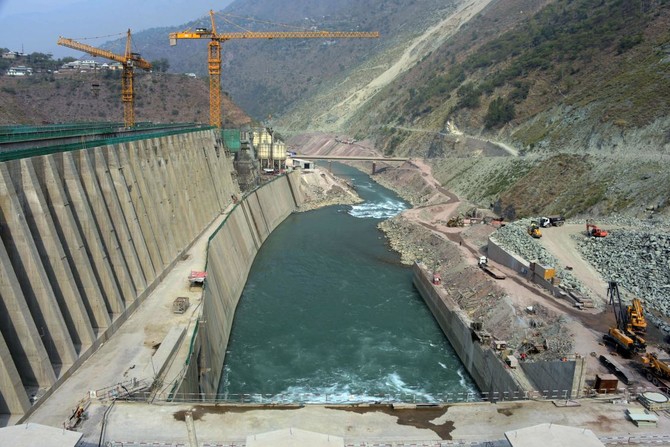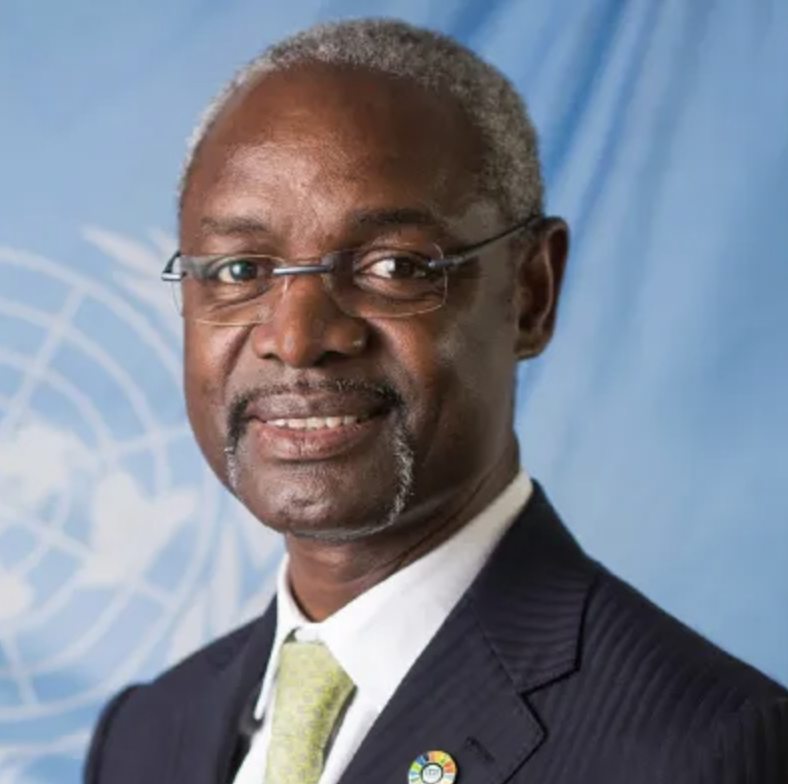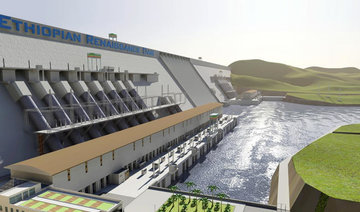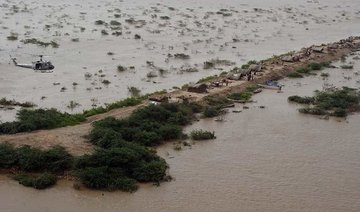MUZAFFARABAD: Several hundred meters underground, thousands of laborers grind away day and night on a mammoth hydroelectric project in contested Kashmir, where India and Pakistan are racing to tap the subcontinent’s diminishing freshwater supplies.
The arch rivals have been building duelling power plants along the banks of the turquoise Neelum River for years.
The two projects, located on opposite sides of the Line of Control — the de facto border in Kashmir — are now close to completion, fueling tensions between the neighbors with Pakistan particularly worried their downstream project will be deprived of much-needed water by India.
The Himalayan region of Kashmir is at the heart of a 70-year conflict between the nuclear-armed foes, with both sides laying claim to the conflict-riven territory.
The rivalry on the Neelum is underlined by both countries’ unquenchable need for freshwater, as their surging populations and developing economies continue to stress already diminished waters tables.
This situation represents a serious challenge to Pakistan’s food security and long-term growth, its central bank recently warned in a report.
The geography of the wider region only exacerbates the problem.
The Indus River — into which the waters of the Neelum ultimately flow — is one of the longest on the continent, cutting through ultra-sensitive borders in the region.
It rises in Tibet, crosses Kashmir and waters 65 percent of Pakistan’s territory, including the vast, fertile plains of Punjab province — the country’s bread basket — before flowing into the Indian Ocean.
The Indus Water Treaty, painfully ratified in 1960 under the auspices of the World Bank, theoretically regulates water allocation between the countries and is considered a rare diplomatic success story amid a bitter history.
It provides India with access to three eastern rivers (the Beas, Ravi and Sutlej) and Pakistan with three in the west (the Indus, Chenab and Jhelum), while setting the conditions for water usage.
As a tributary of the Jhelum River, the Neelum theoretically falls into Pakistan’s sphere, which launched the Neelum-Jhelum power plant project a quarter of a century ago to counter the legal, but competing Kishanganga project in Indian Kashmir.
At the confluence of the Neelum and Jhelum, the gigantic underground cathedral of concrete and steel is near completion — the four generators are in place, waiting for the transformers and the network to be connected.
More than 6,000 Pakistani and Chinese workers busy themselves in the 28 kilometers (17 miles) of underground tunnels or in the power station itself, buried under 400 meters of rock in the heart of the Himalayas.
After completion, the dam is expected to churn out 969 MW of electricity by mid-2018.
“It is a fantastic feeling to see the outcome of such a historic project,” enthused Arif Shah, an engineer working on the site for eight years.
“We hope to finish our hydroelectric plant before the Indians,” he smiles, while acknowledging that the real pressure comes from Islamabad, which has promised to end the debilitating power cuts nationwide ahead of the the 2018 elections.
On the Indian side, the Kishanganga power station is also in its final phase, but has delayed its late 2017 completion date, according to an official, in part because of ongoing unrest in the Kashmir valley.
Pakistan has filed cases at the World Bank against India and the Neelum dam, which it says will unfairly restrict the amount of water headed downstream.
According to the plant’s director Nayyar Aluddin, the production of electricity could shrink by 10-13 percent because of the Indian project.
But the hydroelectric projects on the Neelum River are only one of several points of friction between the two countries as the Indus Treaty faces increasingly pressing disputes.
Beyond the technical bickering, Islamabad is especially afraid of India cutting into its precious water supplies during strategic agricultural seasons that are key to feeding the country’s 207 million residents.
The possibility of hitting Pakistan’s food supply is regularly amped up by both Indian and Pakistani media, stretching perennially taut relations.
India’s Prime Minister Narendra Modi hinted at such reprisals following an attack in Indian Kashmir blamed on Pakistani insurgents in September 2016.
“Blood and water can’t flow together,” he said.
However, a blockade of any significant magnitude is not really technically feasible, while neither party has seriously sought to challenge the Treaty of the Indus.
“The disputes over the barrages are mostly symptoms of poor bilateral relationships,” said Gareth Price, a researcher at Chatham House.
The problem is that the rival countries conceive water as a zero-sum game — if one taps the resource, it means they are lost to the other.
But Islamabad must do its part, wrote Neil Buhne, UN coordinator in Pakistan, in an op-ed calling for the country to diversify “its water resources” while reigning in inefficiencies that wastes water.
In Kashmir, Pakistan and India race to tap the Himalayas with hydroelectric projects
In Kashmir, Pakistan and India race to tap the Himalayas with hydroelectric projects

Oil Updates – crude rises on upbeat China data, shaky Israel-Lebanon ceasefire

SINGAPORE: Oil prices rose on Monday, supported by strong factory activity in China, the world’s second-largest oil consumer, and heightened tensions in the Middle East as Israel resumed attacks on Lebanon despite a ceasefire agreement.
Brent crude futures climbed 57 cents, or 0.79 percent, to $72.41 a barrel by 10:00 a.m. Saudi time while US West Texas Intermediate crude was at $68.58 a barrel, up 58 cents, or 0.85 percent.
“Oil prices have managed to stabilize into the new week, with the continued expansion in China’s manufacturing activities reflecting some degree of policy success from recent stimulus efforts,” said Yeap Jun Rong, market strategist at IG.
This offered slight relief that oil demand from China may hold for now, he added.
A private-sector survey showed China’s factory activity expanded at the fastest pace in five months in November, boosting Chinese firms’ optimism just as US President-elect Donald Trump ramps up his trade threats.
Still, traders are eyeing developments in Syria, weighing if they could widen tension across the Middle East, Yeap said.
A truce between Israel and Lebanon took effect on Wednesday, but each side accused the other of breaching the ceasefire.
In a statement, the Lebanese health ministry said several people were wounded in two Israeli strikes in south Lebanon. Air strikes also intensified in Syria, as President Bashar Assad vowed to crush insurgents who had swept into the city of Aleppo.
Last week, both benchmarks suffered a weekly decline of more than 3 percent, on easing concerns over supply risks from the Israel-Hezbollah conflict and forecasts of surplus supply in 2025, even as OPEC+ is expected to extend output cuts.
The Organization of the Petroleum Exporting Countries and their allies, known as OPEC+, postponed its meeting to Dec. 5 and is discussing delaying its oil output hike due to start in January, OPEC+ sources told Reuters last week.
This week’s meeting will decide policy for the early months of 2025.
“The extension of output cuts would allow OPEC+ more time to assess the impact of Trump’s policy announcements with regards to tariffs and energy and also to see what China’s response will be,” said Tony Sycamore, IG’s Sydney-based market analyst.
Since the group’s production hike had been widely expected, the market’s focus may be on the extent of delay to sway crude prices, said IG’s Yeap, adding: “An indefinite delay may be the best case for oil prices, given that earlier rounds of delays by a month or so have failed to drive higher oil prices in line with what OPEC+ intended.”
Brent is expected to average $74.53 per barrel in 2025 as economic weakness in China clouds the demand picture and ample global supplies outweigh support from an expected delay to a planned OPEC+ output hike, a Reuters monthly oil price poll showed on Friday.
That is the seventh straight downward revision in the 2025 consensus for the global benchmark, which has averaged $80 per barrel so far in 2024.
COP16: Largest-ever UN meeting on desertification starts in Riyadh

RIYADH: The largest-ever meeting of the UN Convention to Combat Desertification has kicked off in Riyadh, with bolstering global drought resilience one of the key goals.
Running from Dec. 2 to 13, the first few days of COP16 are set to see a number of high-profile summits, ministerial dialogues, and announcements to address the pressing challenges associated with land degradation, degradation and drought.
French President Emmanuel Macron is expected to be among the attendees, as is the President of the World Bank Ajay Banga.
The opening day of the event will see Saudi Arabia use its presidency of the event to launch the Riyadh Global Drought Resilience Initiative, in a bid to accelerate international action in this area.
In tandem, the Saudi Green Initiative Forum, running from Dec. 2 to 3, will include hundreds of policymakers, business leaders and subject matter experts from across the world in a dedicated pavilion in the COP16 Green Zone.
The Second International Forum on Greening Technologies is also set to take place in the Green Zone between Dec 6-8, including dozens of tailored sessions to explore solutions, innovations, and lessons learned from global greening projects, alongside showcasing the scientific research associated with restoration projects around the world.
10.43 a.m. - Private sector funding crucial to tackling degradation, UN executive says

Restoring the world’s degraded land and holding back its deserts will require at least $2.6 trillion in investment by the end of the decade, the UN executive overseeing global talks on the issue told Reuters, quantifying the cost for the first time.
More frequent and severe droughts as a result of climate change combined with the food needs of a rising population meant societies were at greater risk of upheaval unless action was taken, Ibrahim Thiaw said.
A large chunk of the around $1 billion a day that is required will need to come from the private sector, said Thiaw, who is executive secretary of the UN Convention to Combat Desertification.
“The bulk of the investments on land restoration in the world is coming from public money. And that is not right. Because essentially the main driver of land degradation in the world is food production... which is in the hands of the private sector,” Thiaw said, adding that as of now it provides only 6 percent of the money needed to rehabilitate damaged land.
“How come that one hand is degrading the land and the other hand has the charge of restoring it and repairing it?,” said Thiaw, whilst acknowledging the responsibility of governments to set and enforce good land-use policies and regulations.
With a growing population meaning that the world needs to produce twice as much food on the same amount of land, private sector investment would be critical, he said.
To hit $2.6 trillion — approaching the annual economic output of France — the world needs to close an annual gap of $278 billion, after just $66 billion was invested in 2022, the UN said.
10:36 a.m. - Abdulrahman Abdulmohsen Al-Fadley elected as COP16 president
Tripartite deal signed to strengthen Saudi Arabia’s real estate sector

JEDDAH: Saudi Arabia’s real estate sector is poised for significant growth following a new tripartite partnership designed to enhance housing finance and establish a secondary mortgage market.
Under the patronage of Minister of Municipal and Rural Affairs Majid Al-Hogail a memorandum of understanding was signed on Sunday by the Real Estate Development Fund, Saudi Real Estate Refinance Co., and Al-Ahli Bank. The agreement aims to support the Kingdom’s housing sector and accelerate the development of a secondary mortgage market.
The MoU, which involves the Public Investment Fund’s fully owned SRC and Al-Ahli Bank, marks an important step in fostering closer collaboration between financial institutions. As part of the agreement, Al-Ahli Bank will continue to create mortgage portfolios, which will be refinanced through the SRC, according to the Saudi Press Agency.
This partnership is expected to fast-track the creation of mortgage-backed securities (MBS), both domestically and internationally. By doing so, it will help realize the goals of the Kingdom's housing program, promoting the development of a sustainable and integrated real estate financing system. The initiative will also contribute to expanding housing options for Saudi citizens.
Recent data from the Saudi Central Bank shows that banks in Saudi Arabia disbursed SR60.92 billion ($16.24 billion) in residential mortgages during the first nine months of 2024, marking a 4.88 percent increase compared to the same period in 2023. Of this amount, SR38.85 billion was allocated for home purchases, accounting for 64 percent of the total mortgage loans. However, the share of loans for house purchases declined slightly by 3.38 percent year on year, dropping from 69 percent in 2023.
Demand for apartments has surged in response to urbanization and demographic shifts. Apartments now account for 31 percent of all mortgages, up from 25 percent last year, with lending for apartment purchases reaching SR18.6 billion — an increase of 26.8 percent. Loans for land purchases also grew by 8.26 percent to reach SR3.5 billion, underscoring continued interest in land investment across the Kingdom.
The new partnership aims to provide liquidity in the market, ensuring a continuous flow of mortgage financing and supporting the development of the secondary mortgage market in Saudi Arabia.
At the signing ceremony, Al-Hogail also launched a new financing offer from Al-Ahli Bank, with rates starting as low as 2.59% for those interested in purchasing units under construction.
Mansour bin Madi, CEO of the Real Estate Development Fund, emphasized that the strategic partnership with SRC and financial institutions aims to improve the residential mortgage market and reduce financing costs for Saudi families. He highlighted that the initiative aligns with the objectives of the “Sakani” program and the broader real estate goals of Saudi Vision 2030.
Majeed Al-Abduljabbar, CEO of SRC, noted: “This partnership with Al-Ahli Bank is a crucial step in advancing the mortgage financing market in the Kingdom. Through this collaboration, we aim to offer innovative solutions that enhance liquidity, allowing financial institutions to provide mortgage financing tailored to market needs, while expanding property options for citizens.”
Tareq Al-Sadhan, CEO of Al-Ahli Bank, affirmed that the partnership with SRC demonstrates the bank’s commitment to fostering growth in the housing sector and contributing to the development of a dynamic secondary mortgage market. This, he added, will support Saudi Arabia’s broader economic diversification efforts.
Closing Bell: Saudi main index rises to close at 11,741

RIYADH: Saudi Arabia’s Tadawul All Share Index rose on Sunday, gaining 100.43 points, or 0.86 percent, to close at 11,741.74.
The total trading turnover of the benchmark index was SR4.63 billion ($1.23 billion), as 159 of the stocks advanced and 64 retreated.
On the other hand, the Kingdom’s parallel market Nomu lost 221.58 points, or 0.73 percent, to close at 30,173.12. This comes as 34 of the listed stocks advanced while 48 retreated.
The MSCI Tadawul Index gained 11.24 points, or 0.77 percent, to close at 1,471.59.
The best-performing stock of the day was Gulf Insurance Group, whose share price surged 8.35 percent to SR31.80.
Other top performers included Saudi Arabian Cooperative Insurance Co., whose share price rose 4.61 percent to SR15.44, and Lazurde Co. for Jewelry, whose share price increased 4.26 percent to SR13.70.
Tamkeen Human Resource Co. recorded the biggest drop, falling 11.34 percent to SR68.
Etihad Etisalat Co. also saw its stock prices fall 3.08 percent to SR53.50.
Meanwhile, Northern Region Cement Co. also saw its stock prices dropping 1.86 percent to SR8.98.
On the announcements front, Nice One Beauty Digital Marketing Co. has announced plans to raise up to SR1.2 billion by offering 30 percent of its shares on the Saudi Stock Exchange.
SNB Capital Co. will act as the offering’s lead manager, financial advisor, book-runner, and underwriter.
EFG Hermes Saudi Arabia will join as joint financial advisors, book-runners, and underwriters. The institutional book-building period will run from Dec. 1 to 8.
According to a Tadawul statement, the price range for the offering has been set between SR32 and SR35 per share. The offering is comprised of 34.650 million ordinary shares, representing 30 percent of the company’s capital after the issuance of new shares and capital increase.
The minimum number of offer shares to be applied for participating parties is 100,000, while the maximum is 5.7 million. The participation in the book-building process is confined to the participating parties in accordance with the Instructions for Book Building Process and Allocation Method in the initial public offering issued by the Capital Market Authority.
The final price per offer share will be determined after the completion of the book-building process, to be followed by the individual subscriber’s subscription process. The final allocation of the offer shares will be made after the end of the subscription period for individual investors.
Saudi Arabia’s Economic Council reviews outlook, approves key growth strategies

RIYADH: Saudi Arabia’s Council of Economic and Development Affairs reviewed the Kingdom’s economic outlook and strategies to address global challenges, offering recommendations to support growth and resilience.
In a video conference meeting, the council began by reviewing the quarterly economic report from the Ministry of Economy and Planning, which highlighted key developments in both global and national economies, the Saudi Press Agency reported.
This follows Saudi Arabia’s 2.8 percent economic growth in the third quarter of 2024, driven by strong performance in non-oil sectors, official data showed.
The country’s non-oil sector expanded by 4.2 percent year-on-year, in line with Vision 2030’s goal to reduce dependence on oil, according to a recent report from the General Authority for Statistics.
During the meeting, the council reviewed the Ministry of Finance’s third-quarter report on the performance of the state’s general budget for fiscal year 2024. The report provided a breakdown of financial performance through the third quarter, including indicators for revenues, expenditures, and public debt.
The findings confirm the Kingdom’s ongoing support for development projects, its strengthening of social care and protection systems, and its commitment to implementing major initiatives under Vision 2030.
The Ministry of Commerce also presented a report from the Permanent Committee for Price Monitoring during the third quarter of 2024, outlining the roles and tasks of the committee's participants.
The report highlighted key developments, including global price trends, consumption patterns, and inflation indicators in the Kingdom. It also detailed consumer goods prices for the third quarter and the measures taken to ensure the availability of goods and maintain price stability.
The meeting also covered several other topics and reports, including the National Export Strategy Project, the National Savings Strategy, and initiatives related to financial inclusion and education.
Additionally, the council reviewed the third-quarter 2024 Real Estate Price Index, the executive summary of foreign trade for August 2024, the September 2024 Consumer Price Index report, and the Wholesale Price Index report for the same period.
The meeting concluded with the council making necessary decisions and recommendations on all discussed matters. The council’s recommendations and decisions are set to guide the country’s economic trajectory in the coming months.


















